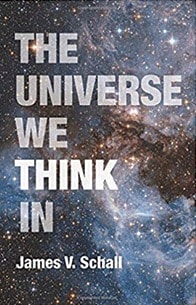
Father Schall wrote (or continues to write) regular columns for many magazines, including Crisis, Gilbert!, the Saint Austin Review, and the University Bookman, not to mention the book reviews, essays and other articles he has contributed to many more.
He earned a master’s degree in philosophy from Gonzaga University, a Ph.D. in political theory from Georgetown University and a master’s degree in sacred theology from Santa Clara University. He taught at the Pontifical Gregorian University in Rome from 1964-77, the University of San Francisco from 1968-77 and from 1977-2012 at Georgetown University. He was a member of the Pontifical Council for Justice and Peace, the National Council of the Humanities and the National Endowment for the Humanities.
Why this extended review of this man’s educational and intellectual background? It simply helps to demonstrate the remarkable academic and intellectual pedigree of the author of a recent book, “The Universe We Think In” (The Catholic University of America Press, $24.95). And the intellectual rigor of Father Schall serves him (and the reader) quite well in this book.
The book begins with Father Schall’s reflections on the time we are allotted here below.
“Indeed,” he asks, following Pascal, “why are we given only a hundred years, if that, and not a thousand to work out what we are?”
The aim of the book, he goes on to explain, is to try in some way to “make sense of the happy limitedness of the time we have among men.”
Father Schall’s sources throughout the book are varied, reflecting the variety of his own influences and intellectual pursuits. He pulls from Scripture and saints, from Aquinas and Shakespeare, from Aristotle and Plato, from Chinese novels and Charlie Brown cartoons. He works, as always, from first principles in a systematic sort of way. This is the best way to approach the profoundly deep questions he explores in the book.
One of the most intriguing questions explored by Schall — and one of the most engaging, the discussion of which begs the reader to continue — is found in the fifth chapter, “Why Do Minds Exist in the Universe?” The question is summarized thus: “Why, in this universe, do we find, in addition to things inanimate and things living by instinct, also a strain of living beings with minds?”
The question gets right at the heart of the question of human existence, human exceptionalism and the purpose of God-given human life.
“Ever since Genesis,” Schall writes, “it has been assumed that the primary purpose of the earth is not simply to continue its existence untouched down the ages, but to provide for the existence and flourishing of man if he sets himself to using it. The purpose of the human race in time cannot simply be to leave the earth and its riches untouched, as if man has no real purpose for being where and what he is. The wealth and abundance of the earth already existing on it even before men arrived makes human life both to exist and to flourish.”
The profound question goes even deeper in the following chapter, “Why Do I Exist?” Schall looks at the question from the viewpoint of revelation, making the observation that many people try to disregard the insights of revelation as not being “scientific,” and therefore of no value.
“But what if what it tells us about the world, God, and ourselves has intelligibility about it? What if it makes some sense? We cannot just walk away from this information as if it is of no concern to us. It provokes us.”
Schall is concerned not with a history of human thought, or the development of modes of human thought. In this wonderful and eminently readable book, Father Schall is digging deeply into the question of why we think, how we think and what that means for a life lived as children of God.
Every creature was willed into being by its creator, and for a purpose.
“Since no finite being caused its own existence,” he writes, “yet still it exists, something else must have caused it to be, and that something else must have had a reason. Thus each person must consider what revelation describes as the purpose of the existence of each human person.”
“The Universe We Think In” does not shy away from the big questions. It embraces them wholeheartedly. Father Schall brings decades of rigorous intellectual pursuits to bear on these questions, and the result is a book that would be an essential resource to anyone who is willing to ask and ponder them.
Paul Senz writes from Oregon.




